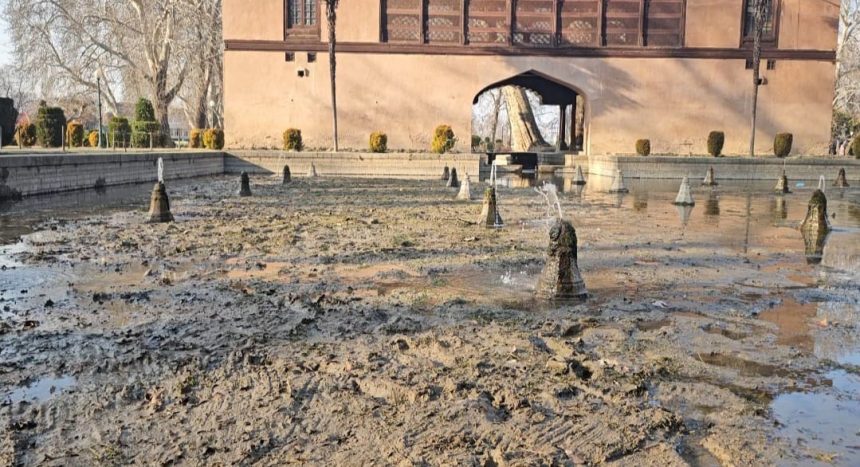The historic Achabal Garden, a jewel of Mughal-era architecture and natural beauty nestled in Anantnag, is facing an unprecedented environmental crisis. For the first time in its centuries-long existence, the garden, celebrated for its cascading waterfalls and natural spring, is drying up, raising alarms about the escalating impact of climate change on the region’s water resources and cultural heritage.
Built in the 17th century by Empress Nur Jahan, the garden has long been an oasis of tranquility, drawing visitors with its lush greenery and intricate water systems. However, rising temperatures, erratic rainfall patterns, and plummeting groundwater levels have led to a severe water scarcity, leaving fountains and streams barren and threatening the garden’s very existence.
“We have never witnessed such a change in the Mughal Garden at Achabal drying up. This is the first time we are seeing such a disheartening scene,” lamented Shabir Ahmad, a local resident and social activist. The complete drying up of the spring, once a reliable source of water for the garden and surrounding communities, has triggered a cascade of problems, including a critical shortage of drinking water.
“Our sins—how we are polluting the water bodies—along with a decline in rain and snowfall due to climate change, are the main reasons for this worsening situation,” Ahmad added, highlighting the intertwined issues of environmental degradation and changing climate patterns.
A Ripple Effect of Water Scarcity
The implications of the drying spring extend far beyond the garden’s borders. The agricultural and horticultural sectors, the backbone of the local economy, are facing a dire threat. “When water is not available, how can we irrigate our land? Both horticulture and agriculture depend on water, and this situation will have a severe impact,” Ahmad explained.
The water scarcity is already affecting nearby areas, forcing residents to rely on water tankers for their daily needs. This dependence underscores the vulnerability of communities reliant on natural springs and underscores the urgent need for sustainable water management strategies.
“Achabal Garden is our heritage, a part of our identity. Seeing it dry up is heartbreaking,” said Mushtaq Ahmad, another local resident, echoing a sentiment shared by many in the region. “If immediate action is not taken, we fear it may never be the same again.”
Experts Weigh In on the Climate Change Impact
Experts attribute the crisis to a confluence of factors driven by climate change. “Climate change has altered precipitation patterns in Kashmir, affecting the natural springs that have sustained Achabal Garden for centuries,” explained Dr. Masoon A. Beig, a geographer. “The reduction in snowfall and prolonged dry spells have further worsened the situation.”
The unseasonably warmer temperatures exacerbate the issue, causing glaciers to melt at an accelerated rate, reducing the period for the availability of spring water. This, in turn, leads to increased evaporation and less water to recharge groundwater supplies, creating a vicious cycle of water scarcity.
Tanker Services Struggle to Meet Demand
Gowhar Ahmad, AEE Jal Shakti Achabal, confirmed the severity of the situation, stating that the Achabal spring once catered to over a dozen villages, with as many as 15 water supply schemes depending on the source. With the spring now dry, the villages are entirely dependent on tanker services.
“Almost 80 percent of the area has been affected due to the drying up of the spring, as it was the primary source of drinking water,” Ahmad stated. “We are sending tankers to the affected villages to ensure water supply.” However, the reliance on tankers is not a sustainable solution, as it places a strain on resources and underscores the need for long-term strategies.
A Call for Collective Action
Environmentalists and local leaders are calling for urgent collective action to mitigate the impacts of climate change and protect the region’s precious water resources. Dr. Masoom Beg emphasized the need for a joint strategy that includes preserving natural resources like forests and banning harmful plastics. He also pointed to the drying up of the Bringi Nallah, a vital water source for Achabal Spring, as evidence of the detrimental impact of illegal human activities.
The crisis at Achabal Garden serves as a stark reminder of the vulnerability of cultural heritage sites and communities to the effects of climate change. Addressing this challenge requires a multifaceted approach that combines sustainable water management practices, conservation efforts, and a commitment to reducing carbon emissions. Only through collective action can we hope to restore the glory of Achabal Garden and safeguard the water resources that are essential for the well-being of the region.







